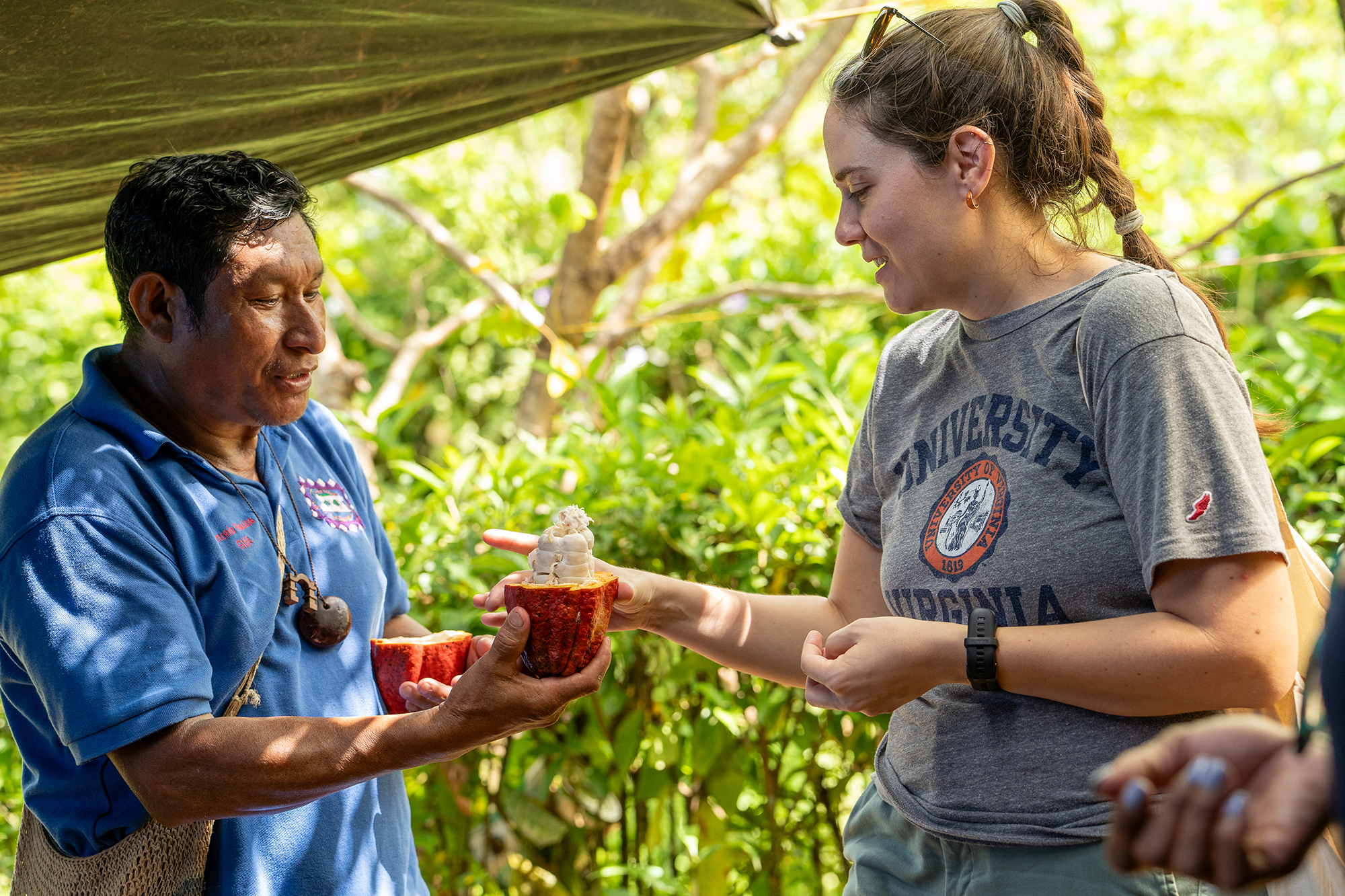A Global Perspective: UMB’s Costa Rica Faculty Development Institute Transforms Teaching
July 09, 2025 Angela Jackson
In the spring issue of “CATALYST,” read about how the Center for Global Engagement brings faculty to Costa Rica, where they are given time to integrate global perspectives into their curricula.
Photo: Megan Dunning, PhD, associate professor of medicine, University of Maryland School of Medicine, receives a cacao pod from Antonio Palacios. Photo by Angela Jackson
Almost 4,000 miles from the University of Maryland, Baltimore (UMB), a small group of faculty members treks through a clearing in the Costa Rican jungle. Their usual work attire has been swapped for breathable athletic wear as a necessary shield against the humid air. They navigate gentle slopes until their guide for the afternoon, Antonio Palacios, a member of the Ngäbe-Buglé community, signals them to stop.
Hanging from a tree, nestled among the greenery, is a cacao pod. Most people associate cacao with chocolate, but the two are not the same. Chocolate is made from fermented cacao beans, often processed with sugar and dairy. Raw cacao, however, has uses that extend beyond sweet treats. Palacios explains that cacao plays a crucial role in sustainable farming in Indigenous communities across Costa Rica. It also has been a staple of traditional medicine for generations, prized for its anti-inflammatory and antioxidant properties.
For Tiffany Buckley, PharmD, a clinical assistant professor who teaches in the Graduate Studies in Medical Cannabis programs at the University of Maryland School of Pharmacy (UMSOP), this moment reinforces why she applied to UMB’s Costa Rica Faculty Development Institute (CRFDI). She came to Costa Rica to develop a course on the clinical use of psilocybin, a field gaining traction in Western medical research but grounded in Indigenous traditions.
“When you do a quick PubMed search, most of the research on psilocybin is from a Western perspective,” Buckley says. “But if I only build a course using Western research, I would be ignoring generations of Indigenous knowledge, including how it’s been used, why, and in what contexts. I applied to the CRFDI to find a way to co-create this course with Indigenous leaders by incorporating their voices and building partnerships between Indigenous communities, my students, and the University.”
A Faculty-Focused Approach to Global Learning
The UMB Costa Rica Faculty Development Institute is an annual program offered by the University’s Center for Global Engagement (CGE). Each year, CGE brings a cohort of faculty participants to Costa Rica, where they are given the time and space to integrate global perspectives into their curricula. Faculty members from across UMB’s seven schools work together to develop ideas, refine approaches, and engage with experts in global education through workshops on globalized teaching, student learning assessment, and ethical considerations in international education.
Amy Ramirez, MA, executive director of global learning and international services, and Virginia Rowthorn, JD, LLM, associate vice president for global engagement, lead the program and work closely with Carlos Faerron Guzmán, MD, MSc, an associate professor at the University of Maryland School of Graduate Studies and director of Centro Interamericano para la Salud Global in Costa Rica. The team oversees the program’s structure and goals and ensures that each cohort has meaningful opportunities to learn from local partners and apply those insights to their teaching.
Since the program launched in January 2023, 35 faculty and staff members have participated, developing courses, modules, and other learning experiences that bring global content into UMB’s classrooms and co-curricular programs. By examining how countries outside the United States approach health care, social services, and scientific research, faculty participants bring back valuable insights that allow their students to gain new perspectives on applying international practices to their fields.
Read more about the Costa Rica Faculty Development Institute here.
The latest issue of "CATALYST" magazine highlights the School of Pharmacy's Mass Spectrometry Center; Police and Public Safety's comfort K9 Poe; Bill Joyner, JD, MSW, of the Office of Community and Civic Engagement; the School of Social Work's B'more for Healthy Babies; the School of Medicine's work to develop physicians for rural areas; facts about the Universities at Shady Grove, and much more.